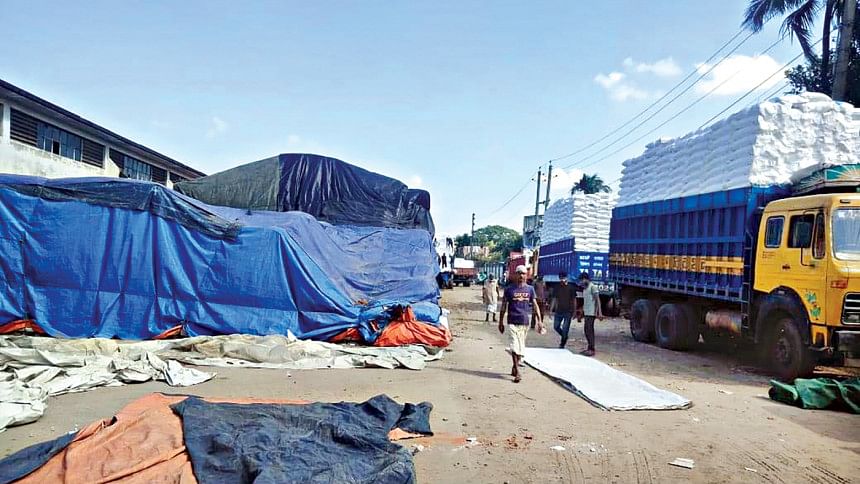Lack of storage compromising fertiliser quality in Rangpur

The Bangladesh Chemical Industries Corporation's (BCIC's) buffer warehouse in Rangpur is grappling with a severe shortage of storage space that has left authorities with no choice but to store excess fertiliser stocks outdoors.
This has raised concerns that the stocks could be damaged by exposure to sunlight and rain, especially as the only means of protection for these stocks are simple polythene coverings.
The buffer warehouse currently holds 10,500 tonnes of fertiliser, more than double its maximum storage capacity of 5,000 tonnes. This has created a critical management challenge that warehouse authorities emphasised must be resolved as soon as possible.
The problem only intensifies during the peak agricultural season from November to March as fertiliser demand rises manifold, with Rangpur requiring around 45,000 tonnes of urea for crops like potato and paddy.
The annual demand for urea in the district is approximately 80,000 tonnes, which is supplied through 106 authorised dealers.
Foysal Ahmed, deputy manager of the warehouse, said they are taking measures to ensure the safety and quality of stocks kept under open skies.
During off-peak periods, authorities stockpile fertiliser for emergency use, which further strains the warehouse's limited capacity, Ahmed added.
To address the crisis, the BCIC has acquired land in Rangpur's Darshana to construct a new warehouse with a 20,000-tonne storage capacity.
Ahmed said the new warehouse will eliminate these problems once operational.
Civic leaders and farmers' representatives have also called for a swift resolution.
Palash Kanti Nag, convenor of the Krishak Sangram Parishad in Rangpur, criticised the mismanagement.
"While farmers are struggling with rising fertiliser costs, loss of quality will be another issue if such huge quantities of fertiliser are kept under open skies," he said.
"It is not possible to maintain the quality of fertiliser if it is stored under open skies for a long time. Sometimes it solidifies," Nag added.
Nag claimed the Rangpur buffer warehouse is not the only one suffering from a lack of storage space, saying that warehouses in almost every other district are facing similar issues.
For example, he said, there is a shortage of space at the Baghabari Bandar in the Shajadpur upazila of Sirajganj, a hub that supplies fertiliser to 16 districts under the Rangpur and Rajshahi divisions.
Azizul Islam, a farmer in the Dinajpur sadar upazila, said growers often cannot gauge the quality of fertilisers and therefore end up using an excess amount after not getting the expected results.
"This happens due to the loss of quality of the fertiliser," he added.
Moreover, around 1,500 tonnes of urea fertiliser have been languishing at the warehouse for nearly 14 years due to a long-standing legal dispute regarding its suitability for use, according to officials.
The legal dispute dates back to 2011, when the BCIC identified quality issues in agricultural inputs supplied by Chattogram-based Noor Trading.
Due to defects like torn bags, reduced weight and substandard quality, the fertiliser was deemed unfit for distribution among farmers.
Despite multiple notifications to the supplier, the issue remains unresolved.
As it is evidence in the case, the fertiliser is still stored in the warehouse.
In 2022, the BCIC directed the warehouse authorities to re-bag usable portions of the fertiliser, recovering only 1,099 tonnes of intact urea. However, the ongoing legal proceedings have stalled the disposal of the remaining stock.
Bangladesh meets most of its fertiliser demand through imports.
The government has set a target to import 52 lakh tonnes of fertiliser, comprising 20 lakh tonnes of urea, for the current fiscal year.
Bangladesh used 57.7 lakh tonnes of chemical fertiliser in fiscal year 2023-24, up 2.3 percent compared to the previous year, with urea accounting for 46 percent of the total usage.
A significant portion of fertiliser is required by the country's major crop-producing districts in the northwest region.

 For all latest news, follow The Daily Star's Google News channel.
For all latest news, follow The Daily Star's Google News channel. 



Comments